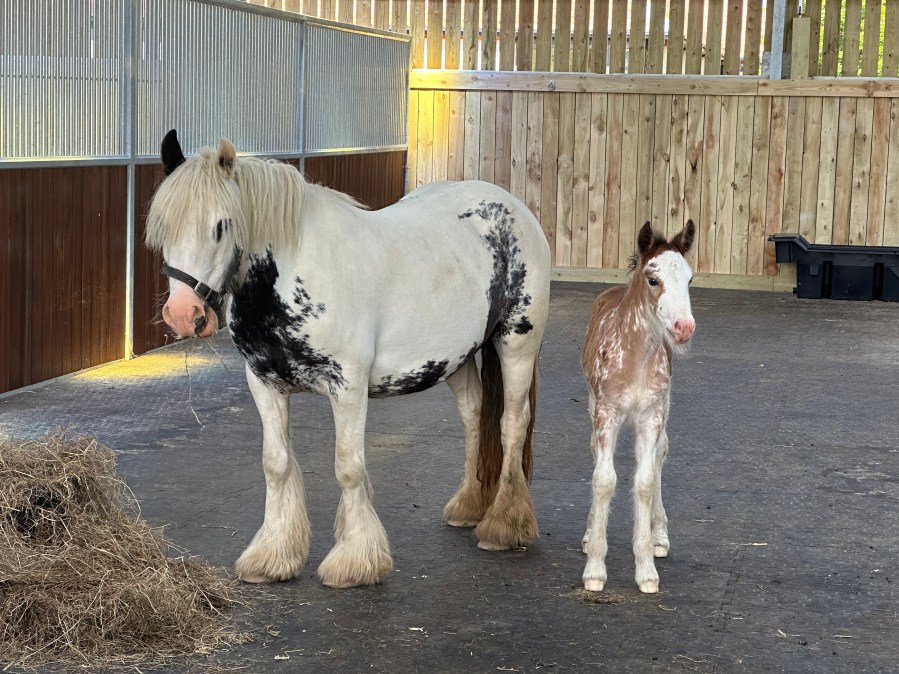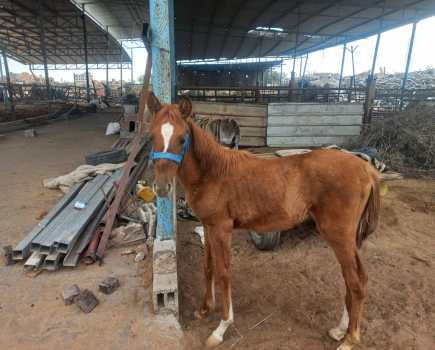New names have been given to a ‘smuggled’ mare and her days old foal since they have found sanctuary with World Horse Welfare.
The last of five in foal mares that were found with 21 other horses and ponies being smuggled out of Dover port has recently given birth to a healthy filly foal. Lacking a microchip, the charity has named the mare ‘Ada’ after their founder and bestowed her surname of ‘Cole’ onto the foal.
The name Cole means ‘victory of the people’ and the charity hopes their story will further raise awareness of the issue of horse smuggling and encourage the public to join their campaign to ensure the right measures are implemented to put an end to this cruel and illegal trade.
“Our charity’s founder Ada Cole campaigned long and hard to try and put an end to horses being transported long distances in terrible conditions to slaughter,” said Kim Ayling, Senior Public Affairs Officer at World Horse Welfare. “And whilst the recent live export ban in the UK is a step in the right direction, horse smuggling means hundreds if not thousands of horses are still being illegally transported into Europe in horrific conditions to end their lives in European slaughterhouses.
“With the UK General Election fast approaching, we are calling on everyone who cares about animals to add their voice to our pledge to show the next government that horse smuggling must be stopped. We need to be the voice for frightened horses, ponies and donkeys across the UK who suffer in horrendous conditions, being transported to an unknown fate. Our voice is their only voice.”
The ‘Dover 26’ mare Ada and her new foal Cole are being cared for and rehabilitated at World Horse Welfare’s Hall Farm Rescue and Rehoming Centre in Snetterton, Norfolk, along with the other horses and ponies that were rescued at the Kent port.
Their story, which was featured in a recent RTÉ documentary about the illegal movement and re-identification of horses, has exposed an industry that appears to be “rampant” across Europe, with the Dover 26 highlighting how British horses can easily be caught up in this trade.
World Horse Welfare is campaigning for a better equine identification and traceability system across Europe to help protect all horses from being smuggled, as well as better enforcement in the UK and for border posts to be manned 24/7.
“Unfortunately due to the lack of information to be able to properly trace the background of the Dover 26 movements before being discovered, it has made a possible prosecution quite challenging,” said Kim. “We have approached all of the local authorities who could have taken legal action and none of them have wanted to take that forward. Unfortunately, this means that in this instance the trader involved will not be prosecuted and they will not have to face consequences for their actions.”
Ada and Cole are being looked after by Hall Farm groom Megan Jarvis, who describes Ada and Cole as the “lucky ones” as they have a bright future ahead of them. Once Cole has been weaned the charity will ensure they are found loving new homes.
World Horse Welfare is urging its supporters to sign a pledge to #StopHorseSmuggling.
“I can’t bear to think about all the other horses that aren’t as lucky as them and having to go on even longer journeys in worse conditions,” said Megan. “I, for one, will be signing the pledge and hope that others will join me in doing the same.”
World Horse Welfare’s #StopHorseSmuggling pledge is for all UK residents who are 18 or over and those who sign will have the option to be kept informed about the charity’s work to end the illegal trade in horses and what else they can do to ensure action is taken by government.
Sign the pledge to #StopHorseSmuggling here.









